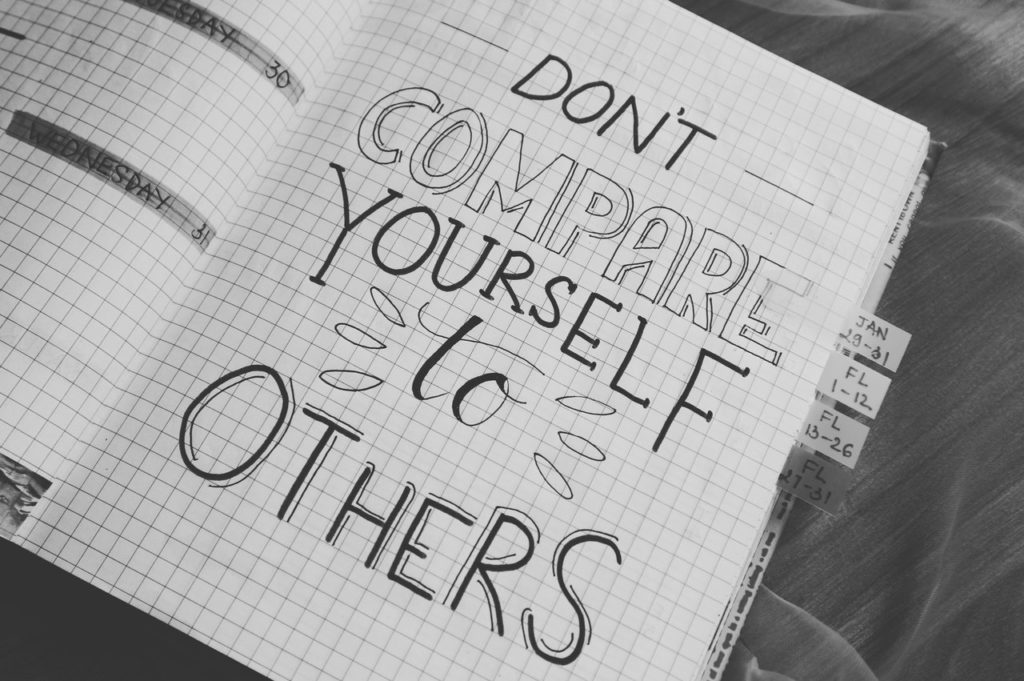Comparing is natural. Yet it can be harmful.
It might start with an acknowledgment of someone’s great qualities to the resentment of self when contemplating how you compare.
If you’ve developed such a tendency, read on to discover everything about the compare and despair cycle and how to stop it.
Let’s dive right into it.

The Compare & Despair Trap: What it means
To help you fully realize the nature of this cycle, I break down some of the questions people ask when trying to understand it below.
What does compare despair mean?
When you’re stuck in a compare and despair trap, you constantly assess your qualities and achievements based on those of other people. And since there’s always someone doing better than you are, you feel disappointed for coming short, which brings you despair.
Although it may start with a few episodes, it develops your mindset and becomes ingrained in your subconscious, which will drive your impulses.
And in this era, social media is making it worse for most people. They can’t stop checking out other people’s feeds while asking why they aren’t where the other person is, burning with jealousy while fueling unquenchable anxiety.
You’re probably stuck in a compare-despair cycle if the following statements describe you:
- When you check out other people’s successes, you often feel like a failure.
- You frequently feel jealous more than motivated by other people’s achievements.
- You think it’s not worth it to move on with your work since it’ll never be as successful as that of others.
You must be wondering, “Why do we compare ourselves in the first place?”
What is comparison and why do we compare ourselves?
Comparison is the reflection of the similarity in various qualities of two or more people or objects. In itself, comparison isn’t bad, it’s even helpful, but some of its applications are harmful.
We compare ourselves because it’s in our nature to evaluate our being through references to other people and things.
All this is explained in The Culture of Social Comparison, an article written by Mathew Baldwin and Thomas Musweiller, scholars from the Social Cognition Center Cologne and the London Business School.
Since other humans are more similar to us than anything else in existence, we find ourselves checking everything from how we should think to the way we should feel against other people who act as benchmarks in our minds.
You might think that this tendency started in your adult life but no. From when you were born, you probably witnessed it in your parents.

Why do parents compare you to others?
“Why can’t you just behave like Steve?” “Your grades are worse than Angela’s, you should be smart like her.” “Why can’t you just be like your brother?” The list of comparisons under parents’ roofs goes on and on.
But why do they do it?
As mentioned earlier, humans are beings of reference. And in a world that applauds children with certain qualities, it’s natural for your parent to compare you with other people they think are doing better than you.
It seems unfair, yes. But before they learn appreciating you for who you are and nurturing you to be your better self, you have to cope with them.
Understand that:
- They want the best for you and are expressing those thoughts in the only way they know how.
- They are experiencing societal pressures and since they don’t know how to handle them, they want you to stack up to those standards.
- They think that’s a way to motivate you.
Whatever their reasons for comparing you with other people, you are the one in charge of your life. You can stop the compare-despair cycle and overcome any urges to use comparison negatively.
Is comparison bad?
I mentioned earlier that it’s in our nature to compare ourselves to other things — mainly other people. But does this mean we are doomed for life because comparing is bad? No.
Contrary to common belief, comparison isn’t necessarily bad. It helps you learn from others. However, constantly comparing to seek validation is bad since it makes you depend on other people’s lives to feel good about your own.
Here are the dangers of constantly comparing yourself to others:
- It births anxiety which degrades your mental health.
- You might slow down your progress by frequently giving up.
- You’ll develop a fixed mindset which believes that you can’t change your abilities and habits.
- It creates discontentment which leads to unhappiness.
But instead of striving to remove comparison from your life entirely, you need to be conscious of when it’s affecting you negatively.

How to Break the Compare & Despair Cycle in 8 Strategies
I’m pretty sure you’ve heard it a lot. “You just have to stop comparing yourself to others, let it go.” And it might feel like something is wrong with you since you just can’t seem to let go of your toxic comparison tendencies.
Well, I’m here to tell you that it takes time to master your urge to compare. And I’ll give you realistic tactics to help you do just that. Here we go!
1. Define success on your own terms
The problem starts when you strive to achieve the success you don’t value. What do I mean?
Your thoughts could go like this, “I’ll get a Ph.D. like Steve so my family and friends can respect me,” “I’ll get a luxurious car no one in my neighborhood has so they can see my success.” “I want to pursue a more prestigious career than any of my friends so they’ll like me.”
If you study the above statements, you’ll realize that none of them have to do with what you perceive as success. This gets you comparing every step of your achievement, looking outward for any validation hence birthing the compare and despair cycle.
So to get out of this trap, you have to regularly evaluate what you genuinely want to do with your life, from the big dreams to the small decisions. You also need to identify the best success metrics for you.
Examples of measures of success include:
- How many people you impact
- The number of books you read
- The goals you’ve accomplished
- Where you are financially compared to where you were before
Determine how you feel accomplished and use that to define your success. This helps you focus on your goals and appreciate the improvements you make because they are worthy to you.
I explain this concept in the following video:
2. Know your triggers
The compare-despair cycle doesn’t show up all the time. It usually manifests when you’re exposed to certain circumstances. Identifying these instances will help you increase your awareness and the chances of stopping the cycle.
So, what makes you feel like a failure in comparison to someone else? Is it a revelation that they have more money, fame, happiness? When does that often happen?
You need to first identify when, where, and why you usually get all riled up by comparison. This way, you can determine how to overcome them and stop the compare-despair cycle.
I’ll break this down further by using the most common comparison trigger as an example.
- When: As I scroll down social media while taking breakfast.
- Where: It mostly happens on my favorite social media site, Instagram.
- Why: I see my friends having fun on vacations and it pains me since I can’t afford to take any time off, let alone have enough money to travel the world.
According to a social comparison study published on Science Direct, most people are usually envious of the experiences others are having more than the material purchases they own.
What triggers you to compare?
3. Limit access to your triggers
Overcoming comparison triggers isn’t easy. Sometimes, you have to pause your exposure so you can gain mental strength with clearer perspectives.
Like in addiction recovery, you have to prevent relapsing to your compare-despair habits by avoiding things that trigger them.
So if for instance you get triggered by other people’s social media posts, it’s best to do a detox or something similar.
However, this isn’t a means to avoid dealing with your comparison issues, no. You can use this time to improve your mental health so you can be more equipped to overcome the compulsion to compare.
4. Challenge the fear of missing out (FOMO)
Whether you like it or not, limiting yourself to some triggers like social media won’t be easy. You might think that you’re missing out and return to the previous compare-despair traps.
FOMO affects us all. But like all fears, you can overcome it.

You can resist the urge to get back on social media or refollow some profiles by asking the fear mindset, “What’s the worst that could happen if you do miss out?” Be real with yourself on what necessary thing could possibly go wrong if you introduce barriers to your comparison triggers.
Challenging your FOMO will help you embrace the joy of missing out (JOMO) which opens up a space for more clarity, spontaneity, self-reflection, and ultimately, happiness.
5. Occupy your mind with constructive activities
Battling with your mind when limiting triggers can be overwhelming. That’s why willpower alone is often not enough to help you abstain from some of your self-defeating habits.
Therefore, you need to be occupied with some other activities to fill the void. The best thing to do here is to bring in pursuits that build you towards your goals.
If you used to check your social media feed after you wake up, you can choose to meditate instead. If you’d normally spend your evenings on youtube, binge-watching lifestyle channels, go and spend time with friends and family instead.
The goal here is to do something to add value to your life and not take from it through comparison-derived discouragement.
6. Choose to identify lessons instead of tolerating jealousy
If you avoid dealing with the emotions causing negative comparison, you’ll fall back to the trap anyway. So you have to face the monster who is mainly jealousy.
Choose to derive lessons from the things that could otherwise cause you to relate with your state of life.
Instead of thinking, “He got the promotion yet he’s so much younger than me” think “How did he get here so early in his life?” Rather than fretting about your peers’ advantages in the industry, determine which of your qualities you could use to bring unique value.
Ann Brashares, a New York Times best-selling author regurgitated this point when she once said, “Do not spoil what you have by desiring what you have not.”
7. Do constant reality checks
You may be unable to limit your exposure to comparison triggers for whatever reason. However, in this case, you can use the invaluable life hack: reality checks.
Studies suggest that your eyes can easily deceive your perception. But if you feel negative comparison lurking, break down the possible reality behind what you’re seeing.
Whether it’s advertising or an expertly photoshopped picture, ask yourself, “Is this a genuine reflection of reality?”
No one has a perfect life, so you shouldn’t feel pressured to have one either. Even if someone else isn’t having the same problems you’re having, they’re experiencing some challenges of some sort — that’s the nature of life.
Instead of wishing someone’s achievement, vacation, or even that perfect dinner date is your own, perform a reality check and apply this next tip instead.
8. Concentrate on your progress
You shouldn’t compare yourself to anyone else except your past self. Why?
This is your journey. And even if you’re following your mentor’s footsteps, your circumstances are your own, your abilities are unique, and subsequently, your results come in a varied timeline.
Your situation might be unfair. But life is unfair anyway. Someone will have better chances than you: rich parents, lots of connections, great looks — you name it. But constantly comparing wouldn’t switch your state of life let alone mind.
Therefore, anytime you’re compelled to compare and despair, think of where you’ve been, where you’re going, and how far you’ve come. Will comparing get you where you want to be? No, if you’re not respecting your progress.
So focus on your progress.

Closing Thoughts
The compare-despair cycle can rob you of the things you desire most. But no matter how it started, you can end it with the above tactics.
Let me know your thoughts on this topic in the comment section below! Also, don’t forget to share this piece with your circle!
Related Posts
People-Pleasing and Control – A Complete Guide
11 Steps To Rewrite Your Story And Change Your Life
Power Of Leverage Yourself – 13 Proven Strategies
